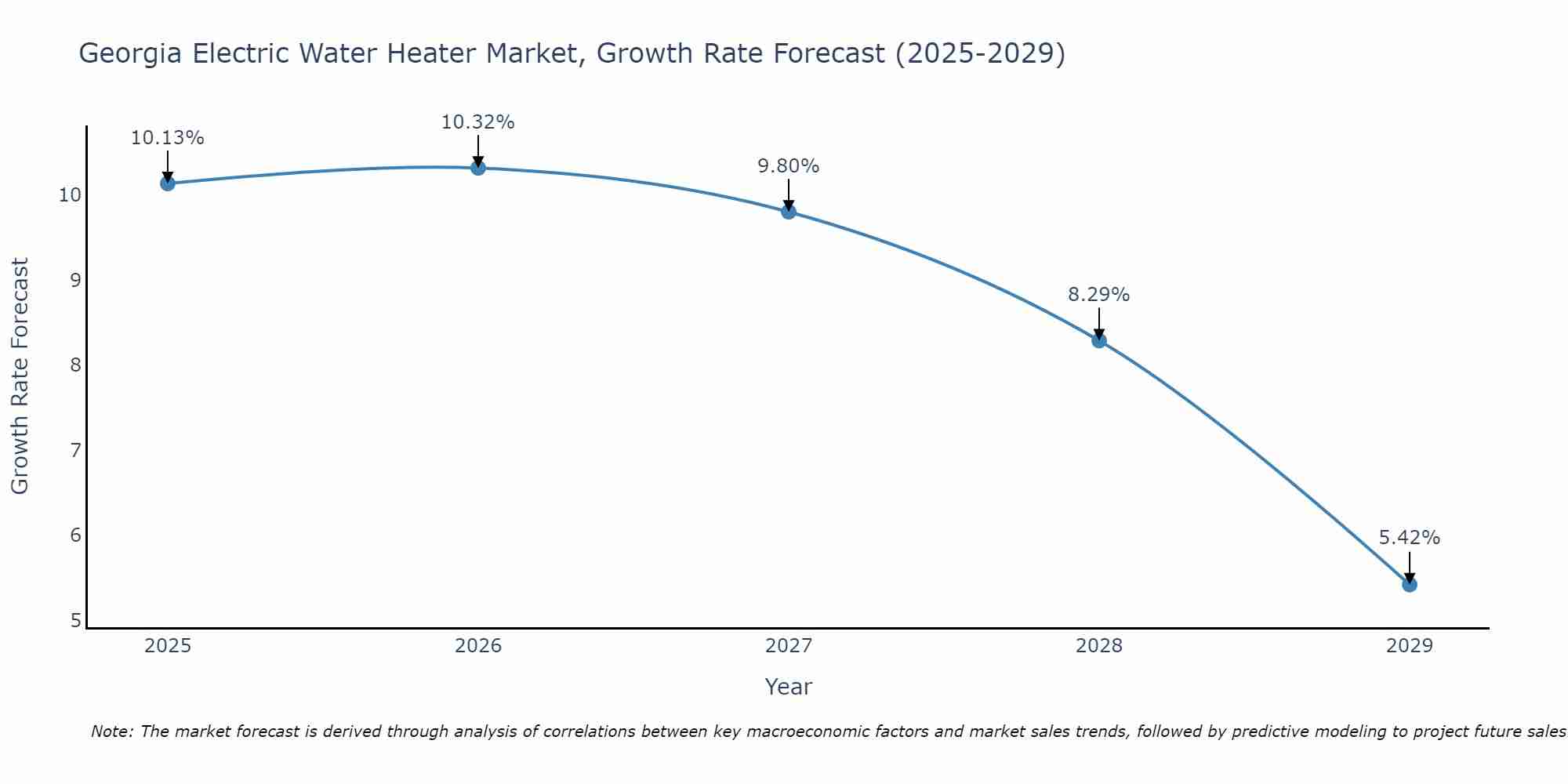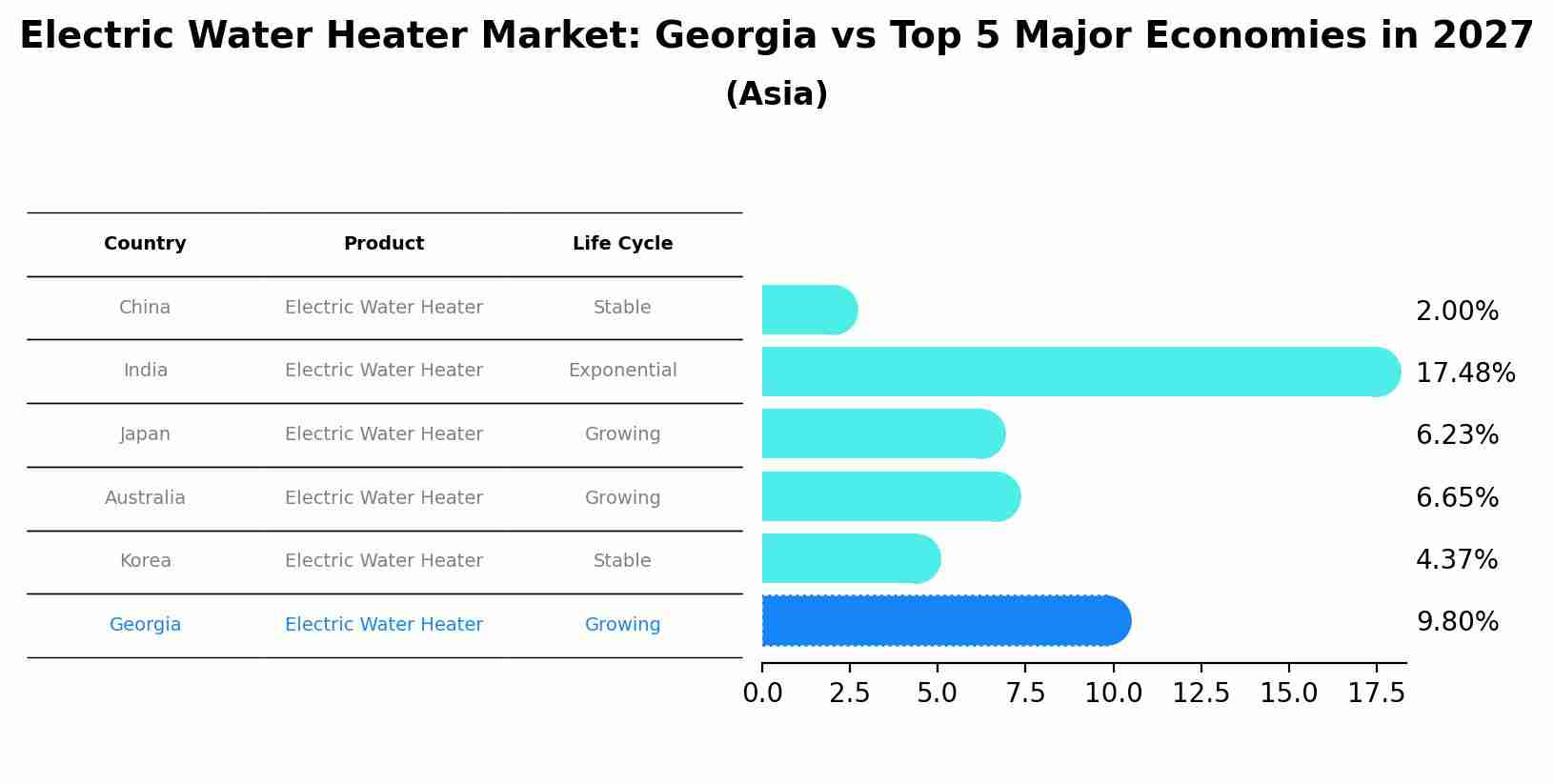Georgia Electric Water Heater Market (2026-2032) | Share, Forecast, Size, Analysis, Companies, Growth, Industry, Value, Trends & Revenue
Market Forecast By Product (Storage Water Heaters (Up to 30 Litres, 30.1 to 100 Litres, 100.1 to 250 Litres, 250.1 to 400 Litres, Above 400 Litres), Non-Storage Water Heaters), By Applications (Residential, Commercial, Industrial) and competitive landscape
| Product Code: ETC261720 | Publication Date: Aug 2022 | Updated Date: Dec 2025 | Product Type: Market Research Report | |
| Publisher: 6Wresearch | Author: Ravi Bhandari | No. of Pages: 70 | No. of Figures: 35 | No. of Tables: 5 |
Georgia Electric Water Heater Market Size Growth Rate
The Georgia Electric Water Heater Market is projected to witness mixed growth rate patterns during 2025 to 2029. The growth rate begins at 10.13% in 2025, climbs to a high of 10.32% in 2026, and moderates to 5.42% by 2029.

Electric Water Heater Market: Georgia vs Top 5 Major Economies in 2027 (Asia)
Georgia's Electric Water Heater market is anticipated to experience a growing growth rate of 9.80% by 2027, reflecting trends observed in the largest economy China, followed by India, Japan, Australia and South Korea.

Georgia Electric Water Heater Market Highlights
| Report Name | Georgia Electric Water Heater Market |
| Forecast period | 2026-2032 |
| CAGR | 6.3% |
| Growing Sector | Commercial |
Georgia Electric Water Heater Market Synopsis
Georgia electric water heater market is expected to register growth in the coming years backed by the increased architectural innovations in the residential domain along with an increase in the construction of residential units at a faster pace which is expected to propel the demand for basic amenities and drive the growth of Georgia electric water heater market in the upcoming six years. Additionally, the introduction of newer technologies with advanced features in electric water heaters which tend to consume less electricity and provide more efficiency is expected to complement the market landscape for Georgia electric water heaters market in the foreseeable future.
According to 6Wresearch internal database and industry insights, the Georgia Electric Water Heater Market is expected to grow at a CAGR of 6.3% during the forecast period (2026-2032). The rising disruption in national activities has disturbed the overall production of electric water heaters, backed by the nationwide restrictions imposed to contain the situation, which has led to a significant disturbance in the sales of electric water heaters in the country and has contributed towards the slow growth of the market. However, increased residential use of water coupled with a heightened need for bathing and hygienic activities has led to an increased demand for hot water, which in turn instigated prospective demand for electric water heaters and simultaneously benefited the growth of the Georgia electric water heater market.
Drivers of the market
The growing awareness regarding energy efficiency and the rising demand for sustainable heating solutions are key drivers of the Georgia Electric Water Heater market. As consumers and industries seek to reduce their carbon footprint and energy costs, electric water heaters offer a viable alternative to traditional heating systems, driving market growth in the region.
Challenges of the market
In the Georgia Electric Water Heater Market, one of the major challenges is addressing energy efficiency concerns and reducing environmental impact. Manufacturers face pressure to develop heaters that consume less energy while providing optimal performance and durability. Moreover, market players must navigate regulatory requirements and consumer preferences for eco-friendly and smart technology solutions.
Government Policy of the market
Georgia government implements energy efficiency standards and consumer protection regulations in the electric water heater market. The Georgia Public Service Commission sets efficiency requirements for water heaters to reduce energy consumption and environmental impact. Rebate programs incentivize consumers to upgrade to energy-efficient models, while regulatory agencies monitor product quality and safety standards.
Key Attractiveness of the Report
- 10 Years of Market Numbers.
- Historical Data Starting from 2022 to 2025.
- Base Year: 2025
- Forecast Data until 2032.
- Key Performance Indicators Impacting the market.
- Major Upcoming Developments and Projects.
Key Highlights of the Report:
- Georgia Electric water heater Market Overview
- Georgia Electric Water Heater Market Outlook
- Georgia Electric Water Heater Market Forecast
- Georgia Electric Water Heater Market Size
- Historical Data of Georgia Electric Water Heater Market Revenues and Volume for the period, 2022-2032
- Georgia Electric Water Heater Market Forecast of Revenues and Volume, Until 2032
- Historical Data of Georgia Electric Water Heater Market Revenues and Volume for the period, By Product, 2022-2032
- Forecast of Georgia Electric Water Heater Market Revenues and Volume, By Product, Until 2032
- Historical Data of Georgia Electric Water Heater Market Revenues and Volume for the period, By Capacity, 2022-2032
- Forecast of Georgia Electric Water Heater Market Revenues and Volume, By Capacity, Until 2032
- Historical Data of Georgia Electric Water Heater Market Revenues for the period, By Applications, 2022-2032
- Forecast of Georgia Electric Water Heater Market Revenues, By Applications, Until 2032
- Georgia Electric Water Heater Market Outlook on Drivers and Restraints
- Georgia Electric Water Heater Market Trends
- Georgia Electric Water Heater Industry Life Cycle
- Porter’s Five Force Analysis
- Georgia Electric Water Heater Market Opportunity Assessment
- Georgia Electric Water Heater Market Share, By Company
- Georgia Electric Water Heater Market Overview on Competitive Benchmarking
- Company Profiles
- Key Strategic Recommendations
Markets Covered:
The report provides a detailed analysis of the following market segments.
By Product:
- Storage Water Heaters
- Up to 30 Litres
- 1 to 100 Litres
- 1 to 250 Litres
- 1 to 400 Litres
- Above 400 Litres
- Non-Storage Water Heaters
By Applications:
- Residential
- Commercial
- Industrial
Georgia Electric Water Heater Market (2026-2032): FAQs
| 1 Executive Summary |
| 2 Introduction |
| 2.1 Key Highlights of the Report |
| 2.2 Report Description |
| 2.3 Market Scope & Segmentation |
| 2.4 Research Methodology |
| 2.5 Assumptions |
| 3 Georgia Electric Water Heater Market Overview |
| 3.1 Georgia Country Macro Economic Indicators |
| 3.2 Georgia Electric Water Heater Market Revenues & Volume, 2022 & 2032F |
| 3.3 Georgia Electric Water Heater Market - Industry Life Cycle |
| 3.4 Georgia Electric Water Heater Market - Porter's Five Forces |
| 3.5 Georgia Electric Water Heater Market Revenues & Volume Share, By Product Type, 2022 & 2032F |
| 3.6 Georgia Electric Water Heater Market Revenues & Volume Share, By Application, 2022 & 2032F |
| 4 Georgia Electric Water Heater Market Dynamics |
| 4.1 Impact Analysis |
| 4.2 Market Drivers |
| 4.2.1 Increasing demand for energy-efficient appliances. |
| 4.2.2 Rising awareness about the benefits of electric water heaters. |
| 4.2.3 Government incentives and rebates for energy-efficient appliances. |
| 4.3 Market Restraints |
| 4.3.1 Fluctuating raw material prices affecting manufacturing costs. |
| 4.3.2 Competition from alternative water heating technologies. |
| 4.3.3 High initial cost of electric water heaters. |
| 5 Georgia Electric Water Heater Market Trends |
| 6 Georgia Electric Water Heater Market, By Types |
| 6.1 Georgia Electric Water Heater Market, By Product Type |
| 6.1.1 Overview and Analysis |
| 6.1.2 Georgia Electric Water Heater Market Revenues & Volume, By Product Type, 2022 - 2032F |
| 6.1.3 Georgia Electric Water Heater Market Revenues & Volume, By Tankless Water Heater, 2022 - 2032F |
| 6.1.4 Georgia Electric Water Heater Market Revenues & Volume, By Storage Water Heater, 2022 - 2032F |
| 6.2 Georgia Electric Water Heater Market, By Application |
| 6.2.1 Overview and Analysis |
| 6.2.2 Georgia Electric Water Heater Market Revenues & Volume, By Residential, 2022 - 2032F |
| 6.2.3 Georgia Electric Water Heater Market Revenues & Volume, By Commercial, 2022 - 2032F |
| 6.2.4 Georgia Electric Water Heater Market Revenues & Volume, By Industrial, 2022 - 2032F |
| 7 Georgia Electric Water Heater Market Import-Export Trade Statistics |
| 7.1 Georgia Electric Water Heater Market Export to Major Countries |
| 7.2 Georgia Electric Water Heater Market Imports from Major Countries |
| 8 Georgia Electric Water Heater Market Key Performance Indicators |
| 8.1 Energy efficiency ratings of electric water heaters. |
| 8.2 Consumer awareness and perception surveys on electric water heaters. |
| 8.3 Number of government incentives and rebates available for energy-efficient appliances. |
| 9 Georgia Electric Water Heater Market - Opportunity Assessment |
| 9.1 Georgia Electric Water Heater Market Opportunity Assessment, By Product Type, 2022 & 2032F |
| 9.2 Georgia Electric Water Heater Market Opportunity Assessment, By Application, 2022 & 2032F |
| 10 Georgia Electric Water Heater Market - Competitive Landscape |
| 10.1 Georgia Electric Water Heater Market Revenue Share, By Companies, 2025 |
| 10.2 Georgia Electric Water Heater Market Competitive Benchmarking, By Operating and Technical Parameters |
| 11 Company Profiles |
| 12 Recommendations |
| 13 Disclaimer |
- Single User License$ 1,995
- Department License$ 2,400
- Site License$ 3,120
- Global License$ 3,795
Search
Thought Leadership and Analyst Meet
Our Clients
Related Reports
- South Africa Stationery Market (2025-2031) | Share, Size, Industry, Value, Growth, Revenue, Analysis, Trends, Segmentation & Outlook
- Afghanistan Rocking Chairs And Adirondack Chairs Market (2026-2032) | Size & Revenue, Competitive Landscape, Share, Segmentation, Industry, Value, Outlook, Analysis, Trends, Growth, Forecast, Companies
- Afghanistan Apparel Market (2026-2032) | Growth, Outlook, Industry, Segmentation, Forecast, Size, Companies, Trends, Value, Share, Analysis & Revenue
- Canada Oil and Gas Market (2026-2032) | Share, Segmentation, Value, Industry, Trends, Forecast, Analysis, Size & Revenue, Growth, Competitive Landscape, Outlook, Companies
- Germany Breakfast Food Market (2026-2032) | Industry, Share, Growth, Size, Companies, Value, Analysis, Revenue, Trends, Forecast & Outlook
- Australia Briquette Market (2025-2031) | Growth, Size, Revenue, Forecast, Analysis, Trends, Value, Share, Industry & Companies
- Vietnam System Integrator Market (2025-2031) | Size, Companies, Analysis, Industry, Value, Forecast, Growth, Trends, Revenue & Share
- ASEAN and Thailand Brain Health Supplements Market (2025-2031) | Strategy, Consumer Insights, Analysis, Investment Trends, Opportunities, Growth, Size, Share, Industry, Revenue, Segments, Value, Segmentation, Supply, Forecast, Restraints, Outlook, Competition, Drivers, Trends, Demand, Pricing Analysis, Competitive, Strategic Insights, Companies, Challenges
- ASEAN Bearings Market (2025-2031) | Strategy, Consumer Insights, Analysis, Investment Trends, Opportunities, Growth, Size, Share, Industry, Revenue, Segments, Value, Segmentation, Supply, Forecast, Restraints, Outlook, Competition, Drivers, Trends, Demand, Pricing Analysis, Competitive, Strategic Insights, Companies, Challenges
- Europe Flooring Market (2025-2031) | Outlook, Share, Industry, Trends, Forecast, Companies, Revenue, Size, Analysis, Growth & Value
Industry Events and Analyst Meet
Whitepaper
- Middle East & Africa Commercial Security Market Click here to view more.
- Middle East & Africa Fire Safety Systems & Equipment Market Click here to view more.
- GCC Drone Market Click here to view more.
- Middle East Lighting Fixture Market Click here to view more.
- GCC Physical & Perimeter Security Market Click here to view more.
6WResearch In News
- Doha a strategic location for EV manufacturing hub: IPA Qatar
- Demand for luxury TVs surging in the GCC, says Samsung
- Empowering Growth: The Thriving Journey of Bangladesh’s Cable Industry
- Demand for luxury TVs surging in the GCC, says Samsung
- Video call with a traditional healer? Once unthinkable, it’s now common in South Africa
- Intelligent Buildings To Smooth GCC’s Path To Net Zero


















